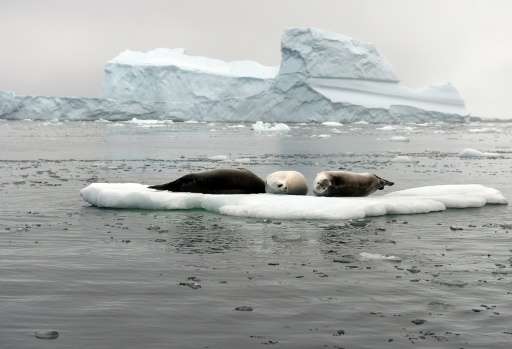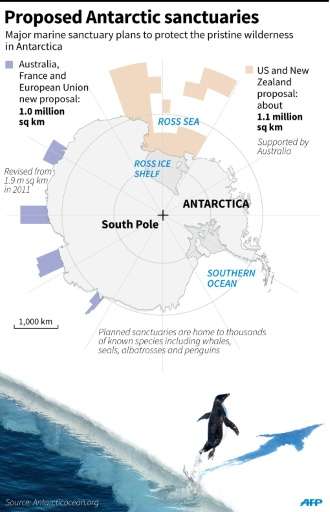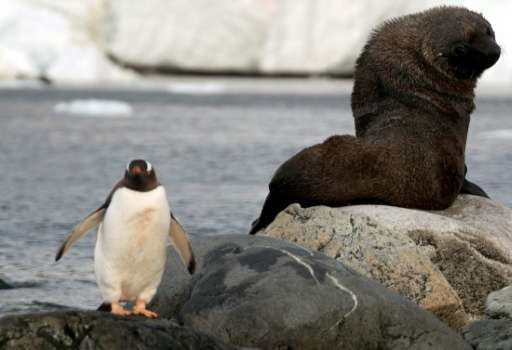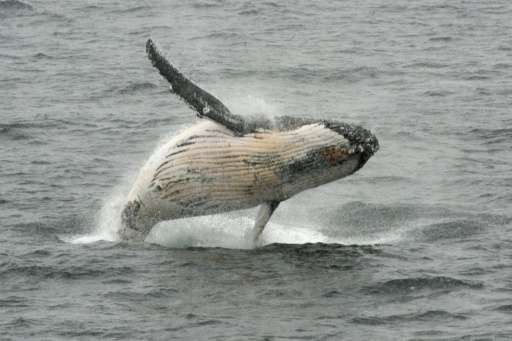Russia holds key to Antarctic marine sanctuaries

Talks opened in Australia on Monday to create two vast marine sanctuaries aimed at protecting the pristine wilderness of Antarctica with Russia and China key to whether they succeed.
The fate of the plans to shield critical areas of ocean around the frozen continent is in the hands of the Commission for the Conservation of Antarctic Marine Living Resources (CCAMLR) at its annual meeting in Hobart, which runs into October 28.
Attempts to create both an Australian-backed East Antarctic scheme and a US-New Zealand bid for a protected zone in the Ross Sea have been repeatedly blocked due to a lack of consensus.
Campaigners at the talks told AFP there was broad agreement among all 24 member countries and the European Union, except China and Russia, which is chairing this year's meeting.
Antarctic Ocean Alliance project director Mike Walker pointed to a recent US decision to expand the huge Papahanaumokuakea Marine National Monument off Hawaii as evidence of growing global momentum to designate Marine Protected Areas (MPAs).
"The time for action to safeguard the Antarctic's waters, the engine room of the ocean, is now," he said.
"Commitments for almost four million square kilometres of MPAs have been made in the past weeks.

"This is a clear indication to all the parties participating in the meeting in Hobart that there is a growing momentum for greater ocean conservation, and Antarctic's oceans and marine life should be next."
At last year's meeting, China finally offered support for the Ross Sea sanctuary, but still opposed the Australian-led East Antarctica reserve, campaigners said.
Russia continues to drag its feet on both, citing geo-political issues and concerns about their size.
But Andrea Kavanagh, director of Antarctic and Southern Ocean work at The Pew Charitable Trusts, said she was upbeat going into this year's summit that Moscow could fall into line.
"This year's global meeting could result in the largest-ever protection of the high seas, and Russia is the key to reaching this goal," she said.

"As the chair of CCAMLR, Russia is approaching this year's negotiations positively."
She cited Russia designating 2017 as the Year of Ecology and its recent move to significantly increase the size of the MPA around Franz Josef Land in the Arctic as reasons for confidence.
Keystone species
Both reserve proposals have been on the table with CCAMLR—a treaty tasked with overseeing conservation and sustainable exploitation of the Antarctic Ocean, also known as the Southern Ocean—since 2011.
Each has been modified as members have debated how to manage the region, which environmentalists say is home to more than 10,000 unique species, including seals and colossal squid. It is also critical for scientific research.

Another key area of discussion in Hobart includes the effective and sustainable management of fishing krill, small crustaceans that are a cornerstone of the Antarctic eco-system.
"Krill are the keystone species of the Antarctic ecosystem and staple diet of many animals, including seals, whales, fish, penguins and flying seabirds," said Gillian Slocum, who is leading Australia's delegation at the talks.
"Current harvests are well below CCAMLR's total allowable catch, but demands on the fishery are expanding as krill is recognised for its value as fish meal and in medical products and supplements."
The meeting will also focus on further cracking down on illegal fishing for toothfish, which is often sold as Chilean sea bass and is popular in high-end restaurants.
© 2016 AFP




















